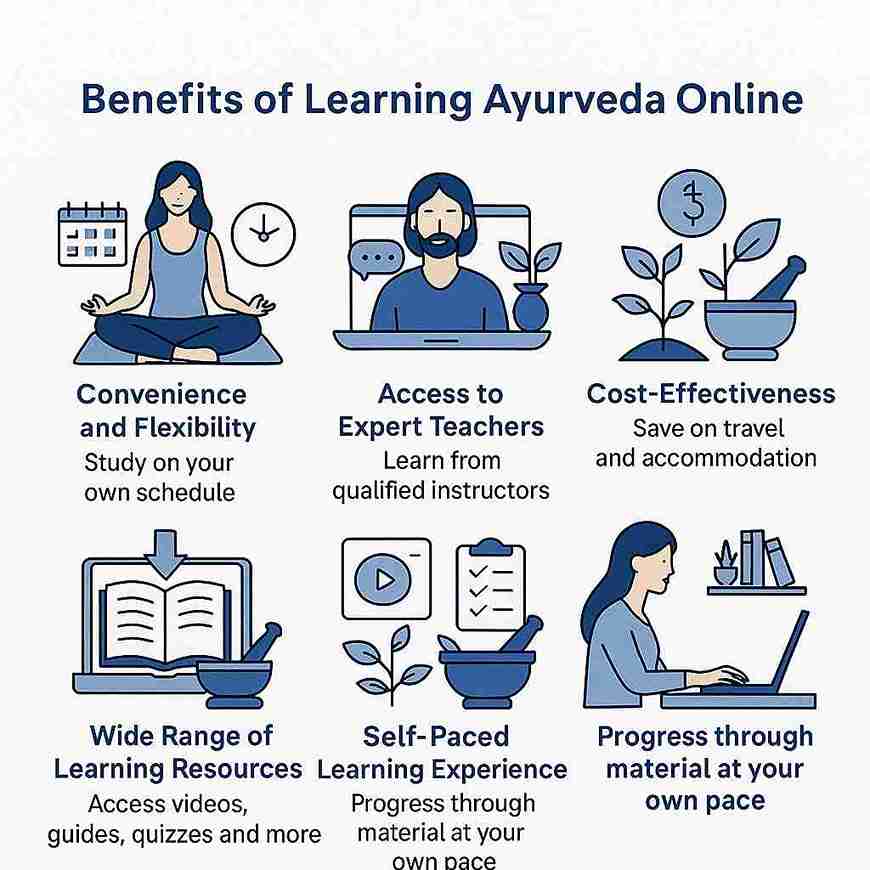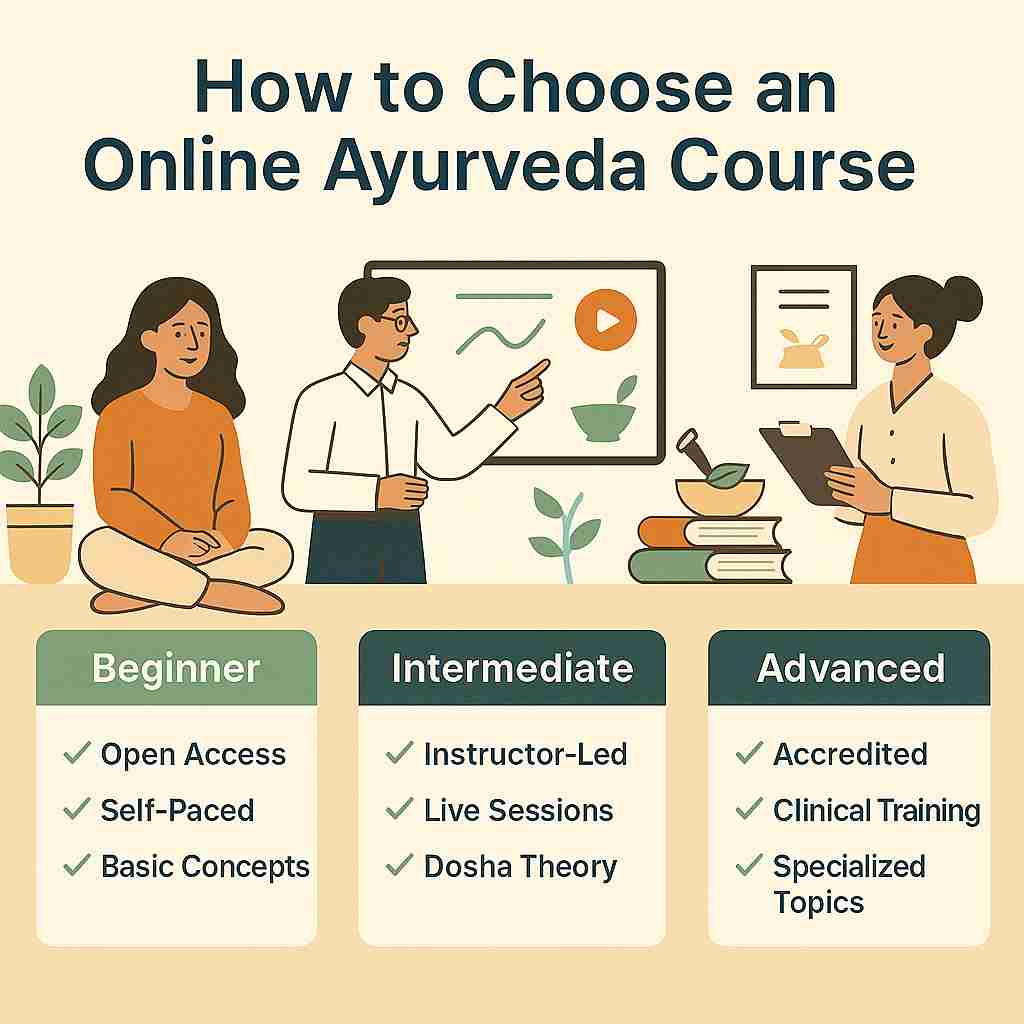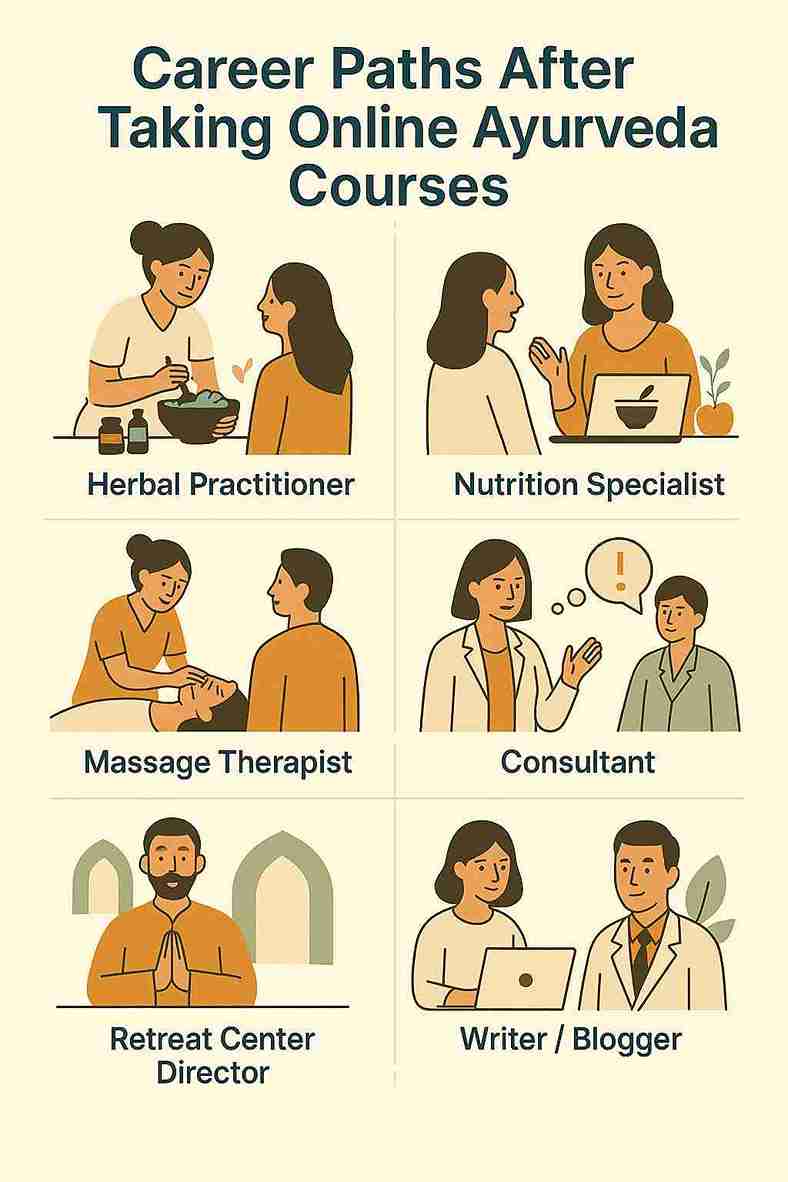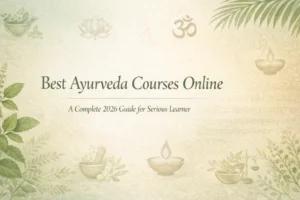Complete Guide to Online Ayurveda Course: Study Ayurveda Online at Your Own Pace

Online Ayurveda Courses: Complete Guide to Choosing, Learning & Building a Career (2025)
Table of Contents

Introduction to Online Ayurveda Courses
A simple, modern guide to understanding how online Ayurveda education works, who it’s for, and why it has become one of the most accessible entry paths into holistic health today.
Ayurveda, a globally popular ancient system of medicine originating in India, offers a holistic approach to health and wellness. With its focus on balance and natural healing, Ayurveda has gained significant attention worldwide, and more people are seeking to understand its principles. One of the best ways to learn about Ayurveda is through Online Ayurveda Courses . These courses provide flexibility, accessibility, and the chance to learn independently.
This comprehensive guide will explore the benefits of online Ayurveda education, how to choose the right course, what to expect, and potential career opportunities once you complete your training. Whether you’re interested in personal development or pursuing a professional career, this guide will help you get started on your Ayurvedic journey.
Over the years, I’ve watched students from across India, Europe, and Southeast Asia thrive through online Ayurveda learning. Many begin with curiosity, but the flexibility of modern digital platforms helps them maintain momentum—something traditional gurukula-style settings struggle to offer to working adults. Online study removes barriers while still carrying the essence of our classical teachings.

🌿 Scope & Learning Boundaries (Important to Know)
Scope of Online Ayurveda Education
Online Ayurveda courses focus on lifestyle guidance, nutrition principles, and holistic wellness education rooted in classical Ayurvedic knowledge. These programs emphasize preventive health, self-awareness, and traditional wisdom adapted for modern living.
Online Ayurveda education does not replace licensed medical training and does not authorize clinical diagnosis, prescription, or treatment unless explicitly aligned with country-specific laws, regulatory frameworks, and governing bodies.
These courses are designed for personal wellness journeys, foundational learning, and non-clinical professional pathways such as wellness coaching, lifestyle consulting, yoga integration, and educational roles.
Benefits of Learning Ayurveda Online
Online Ayurveda courses offer a flexible, accessible, and deeply personal way to learn an ancient science without disrupting modern life.
Convenience and Flexibility
One of the most empowering aspects of Online Ayurveda Courses is their flexibility. Traditional Ayurveda programs often require you to attend in-person classes, which may involve travel and rigid schedules. However, with online education, you can take control of your learning journey, studying at your own pace and on your schedule. This flexibility makes balancing studies with work, family, and other responsibilities easier, giving you the power to shape your education around your life.
Access to Expert Ayurveda Teachers
Online Ayurveda education allows students to learn from qualified and experienced instructors worldwide. Many courses feature video lectures, webinars, and interactive Q&A sessions, ensuring you get the best education without leaving home. Access to expert guidance enhances the learning experience and helps deepen your understanding of Ayurveda.
Cost-Effectiveness
Online Ayurveda Courses are often more affordable than traditional in-person Ayurveda programs, making them a financially savvy choice. You can save money on commuting, accommodation, and course materials. Moreover, many online courses offer payment plans, making it easier for students to invest in their education responsibly.
Wide Range of Learning Resources
Online Ayurveda programs provide a wealth of learning materials, such as video lectures, quizzes, downloadable guides, and discussion forums. These resources are not just accessible anytime—they also ensure that you are well-equipped for your studies, allowing you to revisit lessons and refresh your knowledge whenever needed.
Self-Paced Learning
Many Online Ayurveda Courses are designed to be self-paced, which means you can progress through the material at your own speed. This freedom allows you to thoroughly understand each topic before moving on, ensuring you build a solid foundation of knowledge. The self-paced nature of these courses is particularly beneficial for those with busy schedules or other commitments.
When learners are not rushed, their grasp of Ayurvedic concepts becomes far more intuitive. I’ve seen working mothers, young IT professionals, yoga instructors, and even retired homemakers complete online Ayurveda courses with remarkable confidence simply because the pace respected their reality, not the other way around.

🌿 Types of Online Ayurveda Courses (Beginner to Advanced Levels)
Online Ayurveda education today is not one single track — it’s more like a river with multiple entry points. Some people step in gently, learning how food and routine can heal daily imbalances. Others dive deep to build structured careers as wellness consultants or educators.
Understanding course levels helps you choose the depth that suits your intention — self-healing, professional upskilling, or full-time wellness practice.
1. Beginner & Personal Wellbeing Courses
Your first step into Ayurveda — practical, lifestyle-focused, and immediately usable. These programs are designed for people who want Ayurveda not as theory but as a tool for daily living. You won’t memorize Sanskrit shlokas or medical terminology. Instead, you’ll learn how to read your body like a seasonal calendar — noticing appetite shifts, sleep patterns, stress loops, and emotional states.
Typical modules include:
- Introduction to the three Doshas using real-life trait mapping
- Dinacharya routines adapted to modern work-life schedules
- Basic Ayurvedic nutrition and digestion support
- Lifestyle rhythm-balancing for urban living
- Simple herbal home remedies for immune and gut health
✅ Best for: personal health seekers, yoga students, homemakers, burnt-out professionals, beginners exploring Ayurveda.
2. Intermediate Ayurveda Courses
Where curiosity turns into competence. These courses go beyond “what to eat” and explore why the body behaves the way it does. Students begin connecting mental patterns to digestion, emotional seasons to hormonal rhythms, and stress responses to dosha imbalances.
Assignments typically involve intake observations, journaling-based case studies, and basic protocol design that build real consulting confidence.
Core themes include:
- Deep understanding of Agni (digestive intelligence)
- Ayurvedic psychology and emotional dosha mapping
- Seasonal food combinations and circadian alignment
- Intermediate herbal preparations and applications
- Guided client-style case analysis
✅ Best for: wellness practitioners, yoga teachers, nutrition coaches, serious self-learners.
3. Professional & Certification-Level Courses
Career-oriented pathways for certified practice (non-clinical). Professional programs transform Ayurveda from personal wellness into a structured consulting skillset. These courses teach how to hold ethical client consultations, translate ancient health frameworks into modern habits, and create personalized lifestyle roadmaps for others.
Ideal for:
- Nutrition coaches
- Wellness consultants
- Yoga teachers integrating health therapy
- Holistic therapists and counselors
Modules often include:
- Client intake systems & dosha assessment frameworks
- Personalized diet and lifestyle planning models
- Habit coaching methodologies
- Case supervision & mentorship
- Professional ethics and communication
✅ Graduates are equipped to work as: Ayurveda wellness coaches, lifestyle consultants, educators, or integrative therapists.
⭐ Online Ayurveda Courses Catalog (2025)
A quick overview of the most popular and in-demand online Ayurveda course formats available in 2025. This catalog helps you compare levels, duration, certification options, and ideal learner profiles at a glance.
Ayurveda Foundations
Level: Beginner
Duration: 12–15 hours
Best For: Personal wellbeing
Certification: Yes
Ayurveda Nutrition Course
Level: Beginner–Intermediate
Duration: 20–40 hours
Best For: Wellness & weight balance
Certification: Yes
Herbalism Essentials
Level: Intermediate
Duration: 30–50 hours
Best For: Holistic enthusiasts
Certification: Yes
Advanced Ayurveda Wellness Certification
Level: Professional
Duration: 30–40 hours
Best For: Career upgraders
Certification: Yes
Ayurveda Lifestyle Consultant Course
Level: Professional
Duration: 120–250 hours
Best For: Coaches / Yoga teachers
Certification: Yes
⭐ Which Course Is Right for You?
✔ If you’re a complete beginner
Start with Ayurveda Foundations or Dosha Basics.
You’ll learn core principles, lifestyle routines, and practical self-healing tools.
✔ If you want better digestion, sleep, or mental balance
Choose Ayurveda Nutrition or Lifestyle & Wellness courses.
✔ If you want to help others or start consulting
Choose an Advanced Ayurveda Wellness Coach Certification or
Ayurveda Lifestyle Consultant Course.
These programs offer structured training, practical modules, and supervised assignments.
✔ If you’re a yoga teacher or wellness professional
Pick a bridge-style Ayurveda certification designed for educators, bodyworkers, and therapists.
How to Choose the Right Online Ayurveda Course
Use this clear, practical decision framework to select an online Ayurveda course that aligns with your goals, lifestyle, and the depth of learning you truly want.
Choosing the right Online Ayurveda Course can feel overwhelming, given the many options available. Here are a few important things to keep in mind when making your decision:
Step-by-Step Decision Checklist
A structured way to evaluate and compare courses — like comparing Ayurvedic herbs, each program has a unique guna (quality), veerya (potency), and vipaka (after-effect).
- 1. Check if the course is accredited (AYUSH-aligned / NAMA / IAMA).
- 2. Review the curriculum depth — does it go beyond basics?
- 3. Look at instructor experience — real practitioners or general facilitators?
- 4. Evaluate practical training — demonstrations, assignments, case work.
- 5. Check if you get recordings for lifetime access.
- 6. Compare costs and payment plans — avoid overpriced short courses.
- 7. Read at least 10 student reviews — look for transformation, not “nice course!”.
- 8. Confirm support — Q&A calls, peer groups, chat support.
Mini Decision Matrix (Scorecard)
Score each parameter from 1 to 5 and choose the course with the highest total.
Accreditation
Score: __
Curriculum Depth
Score: __
Instructor Expertise
Score: __
Practical Training
Score: __
Live Support & Q&A
Score: __
Reviews & Reputation
Score: __
Cost & Payment Options
Score: __
Tip: Any course scoring below 22/35 may not give the depth you need.
Accreditation and Certification
When selecting an Online Ayurveda Course, it is essential to check if a recognized institution accredits the program. Accreditation ensures that the course meets high-quality standards and will be respected within the Ayurveda community.
Course Curriculum and Content
The curriculum should cover the essential principles of Ayurveda, such as the doshas (Vata, Pitta, and Kapha), the five elements, Ayurvedic nutrition, herbal medicine, and therapies. Some courses may focus on specific areas of Ayurveda, like herbal healing or food, while others offer a more comprehensive education. Review the syllabus to ensure the course aligns with your goals.
Instructor Qualifications
Check the qualifications and experience of the Ayurveda instructors. Reputable Ayurveda courses feature instructors who are experienced practitioners with years of study and hands-on experience. Look for detailed instructor profiles to assess their expertise and teaching style.
Student Reviews and Testimonials
Student feedback provides valuable insight into the course quality. Look for reviews and testimonials from past students to see if they were satisfied with the course. Reading positive reviews and testimonials can reassure you that you’re making a good choice.
Interactive Learning and Support
Interactive learning features like live sessions, discussion groups, and one-on-one consultations can enhance your experience. These opportunities enable you to engage with instructors and fellow students, making your education more engaging and supportive.
Cost and Payment Plans
Online Ayurveda Courses’ cost varies, so choosing a course that fits your budget is important. Look out for Ayurveda courses that offer flexible payment options, such as installments or early-bird discounts, to make the program more affordable.
Red Flags: Avoid These Types of Courses
- Programs that do NOT state who the instructors are.
- Courses that finish in 7 days but promise “practitioner certification”.
- No accreditation or legitimacy information.
- No student reviews or only generic reviews (“Very good course”).
- No live support, only pre-recorded videos.
When students choose purely based on price, they often end up repeating the course elsewhere. A strong Ayurveda program shapes your thinking, not just your notes. Always invest in the teacher, not the price tag — the right mentors change your confidence, your skill, and your future.
What to Expect from an Online Ayurveda Course
A preview of the learning journey — from foundational concepts to practical skills you’ll use in real-life wellness settings.
Introduction to Ayurveda
Most Online Ayurveda Courses begin with an introduction to the basic concepts of Ayurveda. This includes learning about the history of Ayurveda, its philosophical foundations, and the key principles, such as the three doshas, the five elements, and the concept of balance.
Ayurvedic Diagnosis and Treatments
As you advance in your studies, you will learn about Ayurvedic diagnostic techniques, such as pulse reading, tongue analysis, and observing physical and emotional signs. You will also explore various Ayurvedic treatments, including detox therapies (like Panchakarma), herbal medicine, and natural therapies.
Ayurvedic Nutrition and Lifestyle
One of the key aspects of Ayurveda is its focus on diet and lifestyle. Your Online Ayurveda Course will teach you how to create personalized meal plans based on the doshas and other Ayurvedic principles. You’ll also learn how lifestyle changes—such as sleep habits, exercise routines, and stress management—can help balance your mind and body.
Herbal Medicine and Remedies
Herbal medicine is a core component of Ayurveda. In these courses, you will discover how to use herbs to support health and treat ailments. You will study common Ayurvedic herbs like Ashwagandha, Turmeric, and Triphala and learn how to prepare herbal remedies in teas, powders, and oils.
Yoga and Ayurveda Integration
Many Online Ayurveda Courses incorporate yoga as part of their curriculum. Since yoga and Ayurveda are deeply interconnected, you will learn how to combine Ayurvedic principles with yoga practices to maintain balance and wellness. This can include learning specific yoga poses and breathing techniques (pranayama) that complement Ayurvedic healing.
Practical Application of Ayurveda
A good Online Ayurveda Course should offer hands-on practice. This may involve creating herbal formulas, preparing Ayurvedic meals, or even practicing self-care routines such as Abhyanga (Ayurvedic oil massage). Some courses offer assignments that encourage you to apply Ayurvedic principles to your own life.
Accreditation in Online Ayurveda Education
Accreditation acts like the quality seal of Ayurveda education — it ensures the program meets classical principles, educational standards, and global recognition.
Importance of Accreditation
When you choose an Online Ayurveda Course, make sure it is accredited by a recognized body. Accreditation ensures that the course adheres to professional standards and can be valuable for building your career. Accredited programs are often more respected in the Ayurveda community and provide you with a certification that is recognized by potential employers and clients.
Top Accrediting Organizations
🌿 Authority, Standards & Global Recognition
Accreditation bodies and professional organizations play an important role in setting ethical, educational, and professional standards for non-clinical Ayurveda education worldwide.
Organizations such as the National Ayurvedic Medical Association (NAMA) in the United States, the International Ayurvedic Medicine Association (IAMA) , and India’s Ministry of AYUSH provide guidance related to education quality, ethical conduct, learner safety, and clarity around scope of practice.
Reputable Ayurveda courses aim to align with the principles and standards outlined by such bodies to ensure responsible teaching and transparent educational outcomes.
However, it is important for learners to note that many recognized Ayurveda organizations and regulatory authorities do not yet formally include online Ayurveda courses within their accreditation frameworks. Recognition and acceptance may vary depending on country, jurisdiction, and intended professional use.
Traditional vs. Online Ayurveda Education
Traditional Ayurveda education typically requires physical attendance at a school or institution, where you can participate in live demonstrations and interact directly with instructors. On the other hand, Online Ayurveda Courses provide the convenience of remote learning, allowing students to access video lectures, readings, and interactive sessions from anywhere.
Cost Comparison
In-person Ayurveda courses often involve higher costs due to the need for travel, accommodation, and facility usage. Online Ayurveda Courses, however, can be significantly more affordable, with many courses offering flexible payment options and access to learning materials without extra fees.
Flexibility and Pace
With Online Ayurveda Courses, you can set your own pace. If you prefer to complete lessons quickly or spend more time on complex topics, online education allows you to move through the material at your speed. Traditional courses, however, typically follow a fixed schedule.
🌿 Traditional vs Online Ayurveda Learning: Quick Comparison
Flexibility
Traditional: Fixed schedule
Online: 100% self-paced
Cost
Traditional: High (travel + stay)
Online: More affordable
Access to Teachers
Traditional: In-person only
Online: India-based faculty from anywhere
Learning Resources
Traditional: Physical materials
Online: Videos, PDFs, quizzes, recordings
Practical Training
Traditional: On-site
Online: Demonstrations + home-based practice
Best For
Traditional: Full-time students
Online: Working adults, wellness learners
Overview of Ayurveda Philosophy & Core Principles
Ayurveda rests on timeless principles—the five elements, the three doshas, and the idea that true health begins when mind, body, and lifestyle move in the same direction.
Ayurveda is based on several fundamental principles, including:
The Five Elements
Ayurveda posits that everything in the universe is made up of five elements: Earth, Water, Fire, Air, and Ether. These elements combine in different ways to form the three doshas—Vata, Pitta, and Kapha—which are central to Ayurvedic practices.
The Three Doshas: Vata, Pitta, and Kapha
Each person has a unique constitution, known as Prakriti, which is determined by the balance of the three doshas. Understanding your dosha is crucial in Ayurveda because it influences your physical, emotional, and mental health. Online Ayurveda Courses teach you how to determine your dosha and how to balance it through diet, lifestyle, and therapies.
When students first discover their Prakriti, it often feels like reading a language they already knew but forgot. Many describe it as “finally understanding why my body behaves the way it does.” This foundational self-knowledge becomes the anchor for every further step in Ayurveda.
Suggested Reading
A curated set of articles to deepen your understanding of Ayurveda education, learning pathways, and practical applications.

🌿 Who This Course Is For ?
Who Online Ayurveda Courses Are Ideal For
Online Ayurveda learning is perfect for individuals who want flexible, meaningful, guided study without compromising their work-life balance. These programs support both personal transformation and professional growth.
- Beginners wanting a structured and supportive wellness journey
- Individuals seeking natural solutions for digestion, sleep, stress, and energy balance
- Yoga practitioners & yoga teachers wanting to integrate Ayurveda into teaching
- Wellness coaches, nutritionists, and holistic therapists expanding their toolkit
- Homemakers, working professionals & shift workers needing self-paced learning
- Students preparing for long-term Ayurveda education or certification tracks
- Anyone who prefers flexible, at-your-own-pace study guided by experienced faculty
Career Prospects After Completing an Online Ayurveda Course
Ayurveda opens diverse professional pathways—from clinical practice to coaching, content creation, wellness leadership, and product innovation.
Ayurveda offers a wide range of fulfilling career opportunities across wellness, nutrition, coaching, herbalism, content creation, and teaching. The growing global demand for natural healing systems has expanded the scope for well-trained Ayurveda professionals.
Ayurvedic Practitioner
Becoming an Ayurvedic practitioner allows you to diagnose imbalances and recommend treatments like herbal remedies and dietary adjustments. Completing an Online Ayurveda Course can open the door to a fulfilling career as a holistic healer, either in private practice or within wellness centers.
Ayurvedic Nutritionist
After completing an Online Ayurveda Course, you can work as an Ayurvedic nutritionist, advising clients on how to eat according to their dosha and Ayurvedic principles. Ayurvedic nutritionists create personalized meal plans to balance the body’s energy, improve digestion, and promote overall wellness. This career can involve one-on-one consultations, writing meal guides, or working in holistic health centers.

Herbal Medicine Specialist
A strong focus of Ayurveda is its use of herbs and natural remedies. As an Ayurvedic herbal medicine specialist, you will learn to formulate and recommend herbal remedies tailored to individual health needs. You can work in herbal product development as a consultant or even start your own business selling Ayurvedic herbs, oils, and teas.
Yoga & Ayurveda Instructor
Yoga and Ayurveda go hand in hand, and many online Ayurveda courses integrate both practices. You can teach others how to incorporate Ayurvedic principles into their yoga routines by completing an Online Ayurveda Course. Many wellness centers and retreat centers now offer Ayurvedic yoga, combining the healing aspects of yoga with Ayurvedic lifestyle practices.
Wellness Ayurveda Coach
With your knowledge of Ayurveda, you can become a wellness coach, guiding clients toward holistic health. As an Ayurvedic wellness coach, you’ll work with individuals to improve their overall lifestyle, focusing on stress management, diet, exercise, sleep, and more. Applying Ayurvedic principles can help your clients achieve better balance and health in their lives.
Ayurveda Writer or Blogger
If you are passionate about writing, consider sharing your Ayurvedic knowledge through blogs, articles, or books. Many Ayurvedic practitioners and enthusiasts write to educate others, offering tips on wellness, diet, herbal remedies, and Ayurvedic philosophies. You can build a personal brand as an Ayurvedic writer and create a successful career in content creation.
Product Developer in Ayurvedic Wellness
The Ayurvedic wellness industry is growing rapidly, with increasing demand for natural and organic products. As an Ayurvedic product developer, you could create and market herbal supplements, oils, skincare products, teas, and more. This can be a rewarding career for those who want to create products that promote health and healing based on Ayurvedic principles.
Teaching Ayurveda
Once you’ve completed your Online Ayurveda Course, you can even teach Ayurveda to others. Many online Ayurveda programs need instructors to share their knowledge with new students. You could also host workshops, webinars, and courses to educate people about Ayurveda. Teaching allows you to help spread this ancient wisdom and expand the reach of Ayurvedic healing.
Ayurvedic Researcher
For those interested in the scientific side of Ayurveda, there is an opportunity to pursue a career in Ayurveda research. As a researcher, you can explore the effectiveness of Ayurvedic treatments, study new herbal formulations, and contribute to the growing body of scientific knowledge supporting Ayurveda’s role in modern healthcare.
🌿 What You Can Do After Completing an Online Ayurveda Course
Even at beginner or intermediate levels, students gain practical, real-life skills that meaningfully improve both personal wellness and the wellbeing of those around them.
- Transform their own health using Ayurvedic routines, dietary shifts, and mindful lifestyle rhythms
- Support family wellness with simple Ayurvedic food & lifestyle guidance
- Create Ayurvedic dosha-based recipes and tailored meal plans for different constitutions
- Integrate Ayurveda into yoga teaching, pranayama sessions, and mindfulness practices
- Start offering basic Ayurvedic lifestyle sessions within their community or yoga studio
- Prepare for advanced Ayurveda practitioner pathways and professional certifications
Salary Expectations (India & International)
Ayurvedic Nutritionist
India: ₹25,000 – ₹65,000
International: $900 – $2,500
Ayurveda Wellness Coach
India: ₹30,000 – ₹80,000
International: $1,200 – $3,000
Herbal Medicine Specialist
India: ₹35,000 – ₹1,00,000+
International: $1,500 – $4,000
Many students begin with the intention of helping family members but eventually develop thriving professional practices. The most successful practitioners are those who stay consistent—Ayurveda rewards patience more than speed.
Real Case Studies of Student Success
Real-life examples show how online Ayurveda education helps people rebuild careers, transform personal health, and expand income streams.
A Yoga Teacher Expanding Her Skillset
Priya integrated Ayurvedic meal guidance into her yoga classes. Her students improved faster, and she built a new income stream.
A Homemaker Starting Nutrition Coaching
Leena turned her transformation into a small community practice supporting emotional eating and Kapha imbalance.
A Retreat Practitioner
Anand now works in a Himalayan retreat center designing menus and conducting weekly Ayurveda nutrition workshops.
A Corporate Consultant
Arjun, once an IT professional, now teaches employees digestive balance and healthier eating habits using Ayurveda.
Frequently Asked Questions
Quick answers to the most common questions students ask before enrolling in an online Ayurveda course.
Yes. Online Ayurveda Certifications have become widely accepted due to improved digital learning platforms, better access to qualified teachers, and AYUSH-aligned curriculum options. They are ideal for beginners, working professionals, and wellness practitioners looking to expand skills without relocating.
Absolutely. Most online programs start with foundational modules that help even absolute beginners understand doshas, body types, digestion, herbs, and Ayurvedic routines before progressing into advanced concepts.
Most certificate programs take 1–3 months if self-paced, while advanced courses may last 4–9 months. Hybrid practitioner programs can take 12 months or more depending on the institution.
Practitioner-level programs usually require some hands-on clinical training, but many schools offer hybrid models combining online theory + in-person practicals. For foundational nutrition, theory, herbs, and lifestyle modules, online delivery works extremely well.
Yes — provided the program is accredited, transparent about instructors, and offers structured assessments. Employers typically value practical competence more than the delivery format.
🌿 Continue Your Ayurveda Learning Path
If you’d like to explore specific areas of online Ayurveda study in greater depth, these focused guides will help you choose the right direction. Each link below expands on a particular learning pathway — from herbalism to certification routes to studying Ayurveda in India.
Explore plant medicine, herbs, remedies, and formulation basics for self-care and professional development.
A structured guide to deepening your skills with progressive online training pathways.
Learn how accreditation works, what certificates mean, and how to choose a reputable school.
A clear comparison of in-person vs online learning styles, costs, and flexibility.
Ideal for students who want to move from intermediate study into advanced application.
A simple roadmap for complete beginners who want to start their Ayurveda journey confidently.
A curated list of top-ranking online Ayurveda institutes known for quality teaching and mentorship.
Understand career growth, wellness coaching opportunities, and income pathways.
Blending ancient knowledge with modern delivery methods through live and recorded classes.
Your gateway to structured professional certification aligned with modern wellness careers.
Explore authentic on-ground and hybrid Ayurveda schools across India.
A recommended stepwise route from beginner to professional skill-building.
Build a Healthier, Balanced & Conscious Lifestyle — At Your Own Pace
Choose the Ayurveda course that aligns with your goals and begin your transformation today.
Conclusion
Studying Ayurveda online allows you to bring ancient healing wisdom into modern life—practically, meaningfully, and at your own pace.
Online Ayurveda Courses offer an accessible, flexible, and cost-effective way to learn this ancient system of healing. Whether you’re looking to integrate Ayurvedic principles into your personal life or embark on a new career in holistic health, these courses provide a valuable opportunity to gain in-depth knowledge at your own pace.
By completing an accredited online Ayurveda course, you gain the skills to pursue a career as an Ayurvedic practitioner, nutritionist, herbalist, yoga instructor, or wellness coach. The increasing demand for natural health and wellness solutions makes Ayurveda an exciting field to enter. Whether you’re seeking professional credentials or simply want to enhance your personal health, Ayurveda offers a path to balance and well-being.



